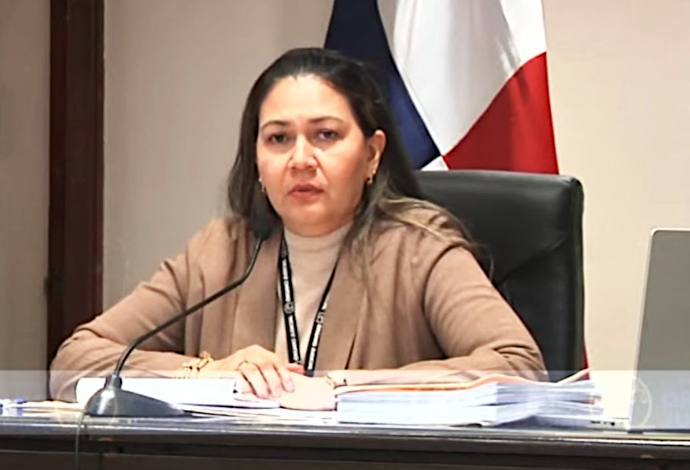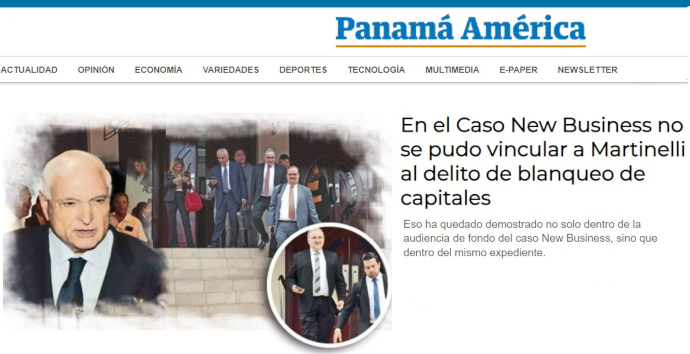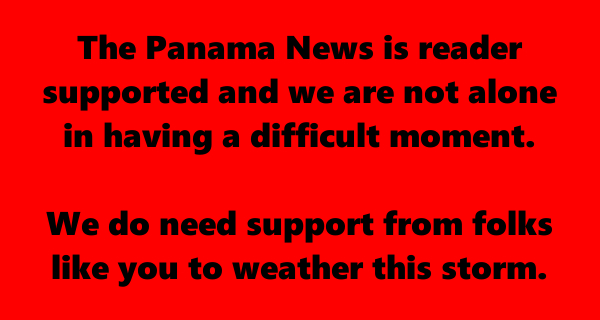Second Liquidator Judge for Penal Cases in Panama Province Baloisa Marquínez. Ricardo Martinelli, his phalanxes of lawyers, his swarms of online trolls and his newspapers have been vilifying her for months. Court photo.
Two verdicts with major political implications
pending from one judge after high-profile trials
by Eric Jackson
If we had a legal system like many in the USA, and a judge with a different temperament, some people would have been summarily thrown in jail for contempt by now. But that seems not to be la jueza’s style. She hears the outrageous motions and just denies them with a poker face. She doesn’t refer to creepy stuff that gets said out of court. She doesn’t allow endless delays by alternating doctors’ notes among defendants and their lawyers.
The job she has — and the special appeals court for those who want in the first instance complain about what she does — is for the most part a judicial reaction to the Ricardo Martinelli style. From the past three administrations there had accumulated a large backlog of public corruption cases, and Panama’s criminal codes don’t have a tolling statute on the time limits to bring and try a case. If a defendant goes on the lam in some other country or region, she or he can wait it out until the statute of limitations has run, unlike in most jurisdictions where such delays turn the calendar off — toll the counting of days, months and years — during the absence.
(Why would a nest of sticky fingers like our National Assembly want to pass something like THAT? They don’t and they haven’t.)
Judge Marquínez? Been there, seen that, wasn’t impressed, had other things in her life and took resigned for a while but then returned to the judiciary. So of course Martinelli’s El Panama America brought up that point, implying some sort of disqualifier.
(Is Don Ricky really intending to run for president on that? Women who resign their professional jobs and after some years off come back are thus incompetent? If someone wants to make an issue of it, that’s a good way to lose a lot of women’s votes, and if he wins it’s also an obstacle to him finding competent women to work in his administration.)
And the “liquidator judge?” As in, there to clear up this docket backlog. Which led one lawyer, Alfredo Vallarino Alemán, to argue in Martinelli’s El Panama America, that because the liquidator courts were created after the crimes were allegedly committed “that would be like the Nuremberg Tribunals.” As in, a court designed to prosecute specially selected people.
(Good luck with the Jewish vote on that one, Ricky, notwithstanding with whom your family is intermarried.)
In any case, in the two pending cases Martinelli was a named defendant in just the first, the New Business trial, named for a “factoring company” through which overpriced public works contracts were skimmed and the money diverted toward the 2010 purchase of the EPASA newspapers — El Panama America, La Critica and Dia a Dia — under the effective control of one Ricardo Martinelli Berrocal. The other case is about the infamous and now defunct law firm of Mossack & Fonseca creating chains of shell companies that were used to launder money for various illicit purposes, the most notorious of which were the “structured operations” bribes and kickbacks paid by the Brazilian-based multinational construction company Odebrecht.
Testimony and arguments in the New Business matter ended in early June, with the judge taking her statutory 30 days to release a judgment, while the court proceeding in the Mossack & Fonseca trial were concluded a month later. One might expect a New Business verdict and possible sentence at any moment, but in a case with a large file a judge can get extra time to rule. The New Business case is so voluminous that it could take a year.
Thus, in the Martinelli papers we get this argument that Marquínez has been busy and can’t possibly hand a judgment down in 30 days, so OBVIOUSLY some behind-the-scenes manipulator has written it for her to sign.
(On the one hand, ‘Well, duh now….” Judges do have clerks who help with the research and drafting of the decisions they make. It would be the absence of these that would be cause for greater alarm.)
We will get the decisions when they come down. But in the new business case, the step or two after that might be most decisive. A criminal conviction and prison sentence would then likely disqualify Ricardo Martinelli from running in next year’s presidential election. And if New Business is a money laundering case instead of directly about the bribery and graft by which said cash was generated to be washed, the EPASA newspapers would have been shown to be stolen property. Even if the prosectors did not ask for such relief, and even if the judge did not extend her reach to that, the president would have the constitutional right to nationalize the property.
At stake, if not directly: the flagship of the Martinelli media empire and a key piece in his political operation, a newspaper that was started in English as The Panama American by Harmodio Arias in the 1920s.
The most frantic claims of political effect have been raised by the Martinelli camp and have to do with his possible loss of political rights. If he is sentenced to prison or the loss of political rights for a period that encompasses May 5 of next year, Martinelli is out. But if he appeals and by December 31 gets the sentence stayed and consideration of the appeals put off until after next year’s elections, he’s on the ballot.
IF…. IF….
Does Martinelli want to roll the dice before a liquidator appeals court largely set up to get around the dilatory tactics that he made notorious? And then go before a Supreme Court without his appointees anymore? He’d probably have to buy judges who are not especially his friends.
Anyway, those are the political implications and possibilities most often mentioned with respect to the two cases that have just been tried by Judge Marquínez. However, not making any definitive political statements and not known to be attending either of the trials, a mostly European team of observers and auditors has been in Panama. They are from the Financial Action Task Force — FATF, or in Spanish GAFI. This is an international organization set up to fight money laundering across national boundaries, major parts of both the New Business and Mossack & Fonseca allegations. They can — and do and have — impose penalties upon jurisdictions that don’t cooperate with the cause. Like, by letting criminal elements hide behind banking and corporate secrecy that can’t be pierced by law enforcement agencies with probable cause to inquire.
The FATF has put Panama on their “gray list” of countries that are opaque to the forces of the law, and from the time it takes to clear an international check, to the scrutiny for multinational loans, to who can readily open a bank a count — and many other transactions — they have Panama figuratively wading through a pool of jello. It’s costing us in many ways, and one of the priorities that President Cortizo emphasized in his recent speech to the nation is the effort to get off of the FATF gray list.
The thing is, Panama has this reputation for protecting politically connected money launderers. The foreign drug runner or swindler is at risk, but historically the Panamanian politician and his or her relatives or business partners are not. So, were the FATF people who were here taking sideways glances at the trials over which Judge Marquínez just presided? Don’t expect them to comment, but don’t bet against them paying attention to those proceedings and their eventual results.
At risk: Panama’s ability to do business in the world if the games keep up like they have. Adobe stock photo.
So, do Martinelli, and “the system,” just need to get past these verdicts to be on their way to less stressful times? Is Baloisa Enereida Marquínez Morán done with the high stress of high profile criminal trials for this year?
See, the judge is working on this other case, for which she has set an August 1 trial date. If someone plays a delay game, the alternate date is in late September. That case, the Odebrecht bribery case, has 36 defendants accused, two of who are former presidents, Ricardo Martinelli and Juan Carlos Varela.
Contact us by email at fund4thepanamanews@gmail.com
To fend off hackers, organized trolls and other online vandalism, our website comments feature is switched off. Instead, come to our Facebook page to join in the discussion.
These links are interactive — click on the boxes














